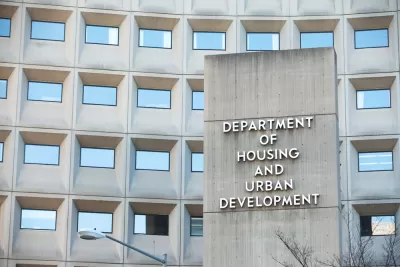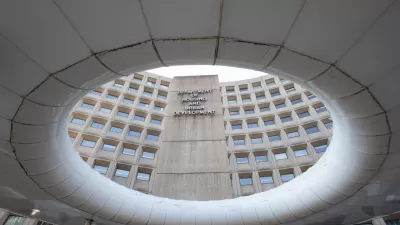A revised U.S. Department of Housing and Urban Development rule makes it more difficult to submit claims of housing discrimination when a landlord's decisions is influenced by a third-party tenant screening service.

The Department of Housing and Urban Development (HUD) changed rules regulating housing discrimination complaints to immunize landlords from discrimination charges, "if they use 'profit' as a reason for their decision-making, or if they use third-party systems to choose tenants," reports Lauren Kirchner. Among landlords, 90% use similar screening services to assess prospective tenants, according to The Markup and a New York Times investigative report.
The Trump administration's new HUD rule effectively dropping discrimination charges related to decision-making influenced by third-party screening services stirred dissent in fair housing proponents. "Even mortgage lenders and realtors eventually distanced themselves from HUD’s proposal—some of them invoking this summer’s seeds of a national reckoning over systematic racism in America," Kirchner says.
While HUD is loosening the rules for the use of algorithm-based screening systems, a groundbreaking Connecticut federal district court trial will decide whether CoreLogic, an algorithmic tenant screening services behind “CrimSAFE," is guilty of housing discrimination in violation of the federal Fair Housing Act. The case is likely the first lawsuit to target a screening company, rather than a landlord, for housing discrimination.
The algorithms behind CrimSAFE, "screens out Black and Latino applicants by relying on criminal records, and that it doesn’t give applicants the chance to explain their mitigating circumstances through more detailed, individualized assessments," explains Kirchner.
FULL STORY: Can Algorithms Violate Fair Housing Laws?

Alabama: Trump Terminates Settlements for Black Communities Harmed By Raw Sewage
Trump deemed the landmark civil rights agreement “illegal DEI and environmental justice policy.”

Planetizen Federal Action Tracker
A weekly monitor of how Trump’s orders and actions are impacting planners and planning in America.

Why Should We Subsidize Public Transportation?
Many public transit agencies face financial stress due to rising costs, declining fare revenue, and declining subsidies. Transit advocates must provide a strong business case for increasing public transit funding.

Understanding Road Diets
An explainer from Momentum highlights the advantages of reducing vehicle lanes in favor of more bike, transit, and pedestrian infrastructure.

New California Law Regulates Warehouse Pollution
A new law tightens building and emissions regulations for large distribution warehouses to mitigate air pollution and traffic in surrounding communities.

Phoenix Announces Opening Date for Light Rail Extension
The South Central extension will connect South Phoenix to downtown and other major hubs starting on June 7.
Urban Design for Planners 1: Software Tools
This six-course series explores essential urban design concepts using open source software and equips planners with the tools they need to participate fully in the urban design process.
Planning for Universal Design
Learn the tools for implementing Universal Design in planning regulations.
Caltrans
Smith Gee Studio
Institute for Housing and Urban Development Studies (IHS)
City of Grandview
Harvard GSD Executive Education
Toledo-Lucas County Plan Commissions
Salt Lake City
NYU Wagner Graduate School of Public Service





























